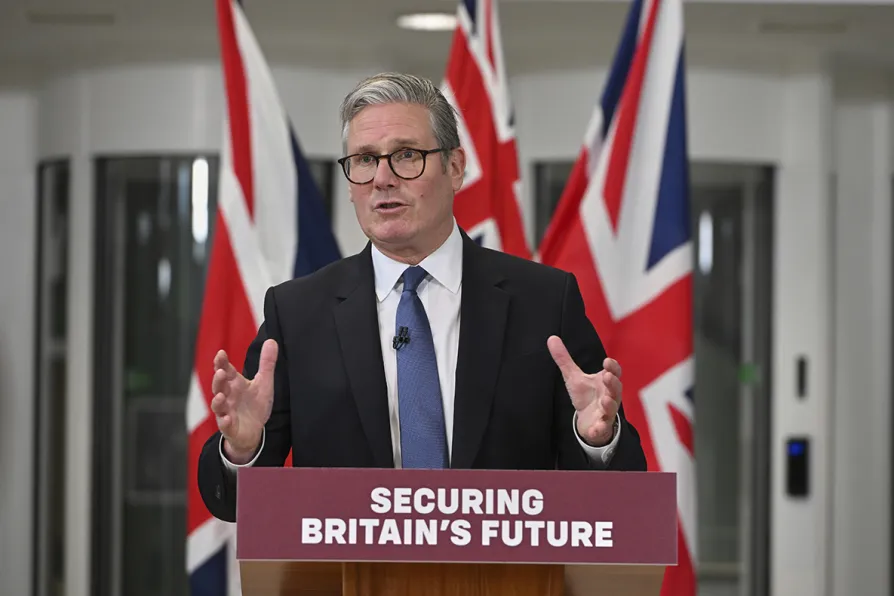
 Prime Minister Keir Starmer speaks during a press conference at a military headquarters in north-west London, May 22, 2025
Prime Minister Keir Starmer speaks during a press conference at a military headquarters in north-west London, May 22, 2025
EFFORTS to end the Ukraine conflict appear to be foundering. Keir Starmer will be leading the rejoicing.
Since Donald Trump initiated serious efforts to bring the three-year-old war to a halt, the British Prime Minister has been working might and main to block any move to peace without appearing to openly contradict the White House.
That is not to minimise the responsibility of Russian President Vladimir Putin and Ukrainian leader Volodymyr Zelensky for the continuation of the slaughter. Both remain committed to maximalist demands that remain beyond their military reach.
Putin, in particular, appears to believe that he will get nearer his neo-tsarist ambitions of a territorial partition of Ukraine and hegemony over the remainder if he keeps flinging young Russians and Ukrainian civilians alike into their graves, since Russia presently holds the upper hand on the battlefield.
However, the labour and anti-war movements in Britain must remain focused on the British government’s role. Starmer has pushed a 30-day ceasefire designed to break Russia’s offensive momentum and allow the resupply of Kiev with weaponry.
This is no more than a propaganda move designed to lull Trump into seeing Russia as solely responsible for the continued fighting.
Starmer has also advanced a “coalition of the willing” involving the deployment of British and French troops to the front line as “peacekeepers,” buttressed by US support. This amounts to a proposal to bring Nato in all but name right up to Russia’s borders, crossing a clear and understandable Russian red line.
And he has also stepped up arms deliveries to Kiev, working with other European powers to ensure that if supplies from the US dry up, Ukraine can continue to fight as long as it wants to. Moreover, the weapons supplied have an increasingly offensive capacity and risk dragging Britain directly into the war.
All of this has worked to obstruct fruitful negotiations, as successive British governments have done throughout.
The conflict has long been a proxy war for Britain, designed to bleed Russia and ultimately menace China too. It is a last-gasp defence of the crumbling world order dominated by the Nato powers.
Starmer’s policy on Ukraine is no better than his approach to Gaza. It is imperialist interests first, and conflict resolution nowhere. The movement must shed any remaining illusions and demand that he stop blocking peace.
David Lammy: a hard act to watch
DAVID LAMMY is taking the public for fools. With a display of new-minted moral histrionics, he denounced the Israeli government’s Gaza genocide — without using the legally loaded word, of course — in the Commons last week.
The only concrete measure he announced, however, was a freeze on trade negotiations with Israel. That fell way short of what is needed, but it was a start.
And yet, who should pop up in Israel this week but trade envoy Lord Ian Austin, a zealous Israel backer, who was given the gig by Boris Johnson as a reward for services rendered.
Moreover, the odious Austin, who spent the visit talking up the advantages of business links with the aggressor, was given a warm social media welcome by the British embassy in Tel Aviv.
It is bad enough that Labour has left Austin in place as trade envoy. Worse still that he is given licence to flout government policy.
The suspicion must be that the contradiction is only apparent and that, in reality, Starmer and Lammy green-lighted his trip to signal to Israel that, beneath the bluster, it is still business as usual.
The lesson is clear. The solidarity movement cannot trust a word Lammy says. Only mass pressure can hold the feet of a government complicit in genocide to the fire.

Washington plays innocent bystander while pouring weapons and intelligence into Ukraine, just as it enables the Gaza genocide — but every US escalation leaves Ukraine weaker than the neutrality deal rejected in 2022, argue MEDEA BENJAMIN and NICOLAS JS DAVIES












